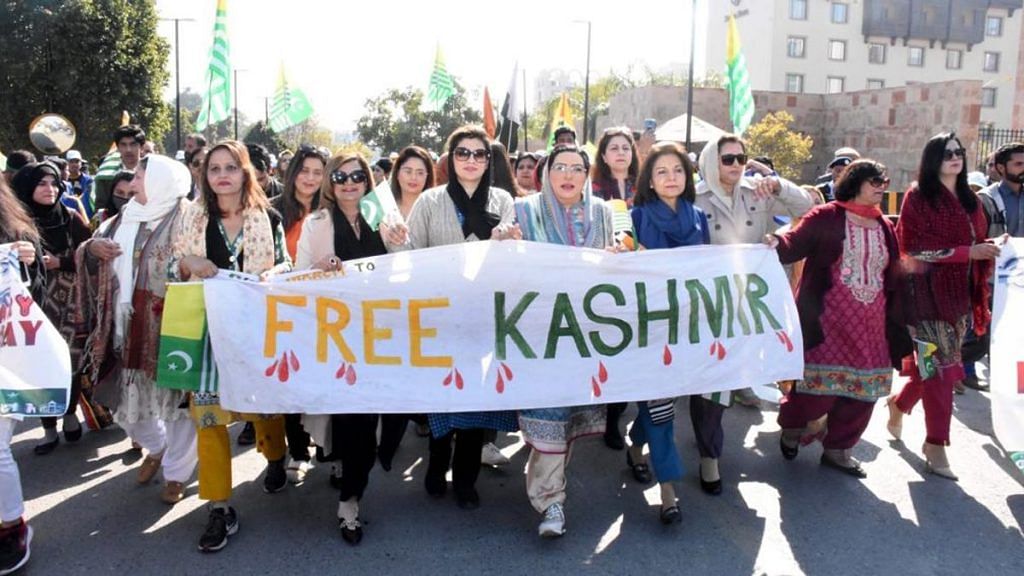Another 5 February has passed and Kashmir nahin bana Pakistan. Kashmir Day is a national holiday in Pakistan meant for expressing solidarity with Kashmiris. Amid aggressive speeches, rhetorical statements by ministers, some new songs and threatening tweets, this Kashmir Day passed with only one reiteration: “Kashmir se humara rishta kya , la ilaha illallah”. Yawn.
Ever since the Narendra Modi government diluted Article 370 stripping Jammu and Kashmir of its special status, every day in Pakistan has been a Kashmir Solidarity Day.
What began originally as a call for strike to show solidarity with Kashmiris in 1975 by then-Pakistan Prime Minister Zulfikar Ali Bhutto was in 1994 recycled into Kashmir Solidarity Day, an official public holiday by the Benazir Bhutto government.
How many days in a year are enough to show support? In Pakistan’s case, the more, the merrier. That’s why 2019 was a combination of black days and half-hour long solidarity days, when we all stood for thirty minutes one Friday from 12 to 12.30 pm. It all seems like yesterday. But then the new decade’s first Kashmir Day promised to be different, only that it wasn’t.
Prime Minister Imran Khan appealed to all Pakistanis last month, at home or abroad, to come out of their homes in support of the eight million Kashmiris who have been besieged by nine lakh Indian Army soldiers for almost six months by the “fascist” Modi regime. Now, if getting out of our houses will get us Kashmir, I promise you PM Khan that I won’t return to my house till the next Kashmir Solidarity Day in 2021. But this is how far Pakistan has reached every 5 February.
Also read: In Modi’s India, Kashmir’s economic catastrophe makes no dent in collective conscience
What won’t free Kashmir
Pakistan’s diplomatic failure after the Article 370 move is evident in how only three other countries — Turkey, China and Malaysia — raised concerns over India’s Kashmir move at the United Nations last year.
Malaysian Prime Minister Mahathir Mohamad had to pay a hefty price for criticising Modi because India last month restricted palm oil exports from Malaysia. In December 2019, PM Imran Khan had skipped the Islamic conference in Kuala Lumpur despite PM Mohamad sending him an invitation. Poetic injustice. However, now PM Khan has not only vowed to flood Pakistan with palm oil from Malaysia to compensate for India’s trade snub to the country but has also expressed hope that he will be able to attend the next Kuala Lumpur Summit. But will he still be the prime minister then? We can’t promise.
For Pakistan, all doesn’t seem well on the Muslim ummah front either. The PM is now shifting the blame of his diplomatic failure onto the Organisation of Islamic Cooperation (OIC) for not being more critical of India on the Kashmir issue. While this criticism is coming not only from Pakistan’s government but also the country’s opposition leaders. They feel Pakistan has been wronged by the OIC for not calling a special session on Kashmir since the 5 August 2019 decision. Pakistan Muslim League-Nawaz leader Khawaja Asif called the 57-nation bloc a “dead horse“.
But ‘Kashmir banega Pakistan’.
After devoting two parliamentary days for debating the Kashmir issue, Pakistan’s National Assembly and the Senate passed resolutions condemning the Indian security forces for committing atrocities against the people in the Valley. But one should give credit where credit is due: Pakistan’s legislators didn’t take this much time to pass three bills last month that extended army chief General Qamar Javed Bajwa’s tenure by three more years. In a deserted National Assembly session Tuesday, several ministers made fiery speeches, threatening PM Modi if he dared to even think of attacking Pakistan. Regardless, even if few people sitting next to them weren’t listening. Whatever their portfolios, all ministers in Pakistan are Kashmir ministers first and the rest afterwards.
The production of new Kashmir Day songs by the Inter-Services Public Relations wing of the Pakistan military and Pakistan Tehreek-e-Insaf has definitely put the enemy in a tizzy. If singing “Kashmir hoon main, shehrag Pakistan ki” or “Aey mere Kashmir Inshallah, tujhe azad kara le gaye Inshallah” won’t free Kashmir, wonder what will. The second bet is Federal Minister for Kashmir Affairs Ali Amin Gandapur’s huge billboard in Islamabad celebrating Kashmir Day.
Also read: China’s stand on Kashmir isn’t surprising. Modi denying global reality is
The real winner
Year after year, the day is celebrated or observed with no “moment of silence” but the reassurance that Kashmir is our jugular vein and that it will become Pakistan one day. So much of the same thing has only numbed us.
The real winner of the Kashmir Solidarity Day is the common Pakistani who sees this day for what it is. A holiday in the middle of the week, a day to freely eat, sleep and maybe get bombarded with “free Kashmir” messages. But not all messaging is bad because Kashmir Day sales in home and clothing outlets are a thing now. So, what if you didn’t get Kashmir? You got a holiday nevertheless.
Also read: Public opinion in Kashmir has now been pushed away from India
There is a slight chance that you may feel guilty about your well-spent day only to read an SMS from Pakistan’s official telecom provider PTA saying: “KASHMIRIS ARE NOT ALONE IN THEIR STRUGGLE FOR FREEDOM, EVERY PAKISTANI IS WITH THEM”. Only that they’re not.
The author is a freelance journalist from Pakistan. Her Twitter handle is @nailainayat. Views are personal.
